- Home
- John Bellairs
Secret of the Underground Room Page 4
Secret of the Underground Room Read online
Page 4
"Strange you should mention it, sir," he said with a puzzled frown. "Strange indeed. Early this morning I sold a ticket to an elderly clerical chap who looked like the one you described. And I must say, he acted very odd! Kept looking around as if somebody was after him. Made me nervous just to talk to him, and I was glad when he left."
The professor swallowed hard and tried to act calm. "Did... did the man say where he was going?"
The clerk smiled. "Well, sir," he said, "my memory isn't that good, but he paid with a travelers' check, and it ought to be in this drawer here. A moment please."
As the professor fiddled impatiently with his watch chain, the ticket seller dug through a collection of papers in the drawer below his desk. It seemed to take forever.
"Ah!" he said at last. "Here it is. A check from the Reverend Dr. Rufus Masterman. And he bought a ticket to Bristol." The man paused and glanced uncertainly at the professor. "Are you with the police or the American FBI, sir?"
The professor laughed loudly and shook his head. "Oh, no! I... well, this old man is a relative of mine, and he's been acting a bit peculiar lately. Thank you for your information. I think the boys and I had better go to Bristol and find out what dear old Dr. Masterman is up to."
A bus for Bristol arrived twenty minutes later, and the professor and the boys got aboard. Bristol is a port city on the west coast of England, near the Bristol Channel. Huge hills loom over the center of the city, where canals have been dug from the nearby river Avon. The canals are called the Floating Harbor, and ships from all over the world dock there. The professor got rooms for himself and the boys at the Grand Hotel, a very dignified old establishment on Broad Street. He couldn't afford to stay long at this place, but he felt that the boys ought to have the experience of staying a few nights at a real first-class hotel.
At dinner that night in the hotel dining room, the professor tried to be optimistic about catching up with Father Higgins and freeing him from the thing that had possessed him. But secretly he was near despair. What if Father Higgins had gone on to some other place? And even if he was here in Bristol, it was a city of a third of a million people. Father Higgins could get lost in it like a raindrop in the ocean. Ah well, the professor told himself, we're here. We'll just have to wait and see what happens.
Just as the three of them were having dessert, Johnny leaned over and poked the professor in the arm. "Look, professor!" he whispered hoarsely. "It's him! Over there!"
The professor turned and looked across the large dining room. Seated at a small round table that was covered with a snowy-white cloth was the horsy-faced, respectable Dr. Masterman. He was quietly sipping an after-dinner brandy and puffing on a cigar.
"God in heaven!" muttered the professor, and tears came to his eyes. He was glad they had found their friend, but it was like finding him ill with some incurable disease. The professor felt helpless, and he hated that feeling more than any in the world.
"Whaddaya think we oughta do?" muttered Fergie.
The professor gritted his teeth and fought to control himself. "There's not much we can do for now," he said quietly. "If we go over there and start bothering that man, we'll get thrown out of the hotel and maybe into jail. And the spirit may have the power to kill Father Higgins. We shouldn't forget about that possibility." The professor fell silent and stared thoughtfully at his plate. Suddenly an idea came to him. "Hmmm... "he said, rubbing his chin. "I wonder... "
Johnny looked hard at the professor. "What is it?" he asked anxiously.
"Hm?" said the professor absentmindedly. "Oh, it was nothing. At least, it probably is nothing—we'll just have to see. For now, let's finish up and go out for a walk. I don't know if Dr. Masterman has seen us, but maybe he hasn't. There's a side door over there."
Late that night the professor came down to the hotel's library to borrow a book, so he could read himself to sleep. After browsing awhile among the leather-covered volumes, he picked out Barchester Towers, which always made him drowsy when he read it. With the book in his hand he stepped out into the dimly lit corridor and headed for the elevator. As usual, the professor walked with his head down, and so he was startled when he ran up against something with a jarring thump. Stepping back, he looked up and found that he was staring at Dr. Masterman. The professor turned pale, but he did not back down. Instead he made the sign of the cross in the air and muttered an old Latin prayer that Father Higgins himself had taught him. In English it meant:
Lord, show us this creature as he really is, not as he seems to be. Banish deceitful visions and let the truth shine forth.
For a second or two nothing happened. Then the air around Dr. Masterman seemed to shimmer, and the professor saw Father Higgins standing there, looking haggard and hollow-eyed. After a blinding flash of light, the professor heard something like a thunderclap inside his head, and he fell to the floor, unconscious.
CHAPTER SIX
The professor awoke in a hospital bed that stood in a sunny corner of a whitewashed room. He was not wearing his glasses, so everything looked out of focus. Two shapes hovered by the bedside, and one reached out to hand him his spectacles. He put them on and saw Johnny and Fergie, who were sitting in chairs and wearing anxious frowns. After an awkward silence Johnny spoke.
"How... how are you feeling, professor?" he asked timidly.
The professor winced. "Well, if you must know," he said, "I feel as if someone had picked me up and slammed me against a brick wall. I'll live, though—don't you worry about that! I'll bet you were wondering what on earth happened to me, weren't you?"
Fergie puckered up his mouth. "Well, yeah, prof. The hotel porter found you knocked out on the hall floor, an' he figured you had had a heart attack or somethin' like that. What really happened?"
The professor pulled himself into a sitting position and calmly told them about his encounter with the creature called Dr. Rufus Masterman. "So there we are, gentlemen!" he said. "At least now we know that we were right about Father Higgins's possession. But the big question remains. What does this demon want, and why does he need Father Higgins? I feel like someone waiting for lightning to strike, only I don't know where it will hit."
The professor grew silent. Johnny noticed that a sea gull had landed on the stone ledge outside the window. He watched as it ruffled its feathers and strutted pompously up and down. Finally Fergie spoke up.
"We asked about Dr. Masterman today at the hotel, and the guy said he had checked out. Whaddaya make of that?"
The professor glared. "What do I make of it?" he snapped. "We are stuck for the time being. Bristol has a big railway station, with trains that go to all parts of England. All Masterman has to do is buy a ticket and vanish. He could even hop aboard one of the freighters here in the harbor—sometimes they take passengers. Or he could be living in another part of Bristol and be impossible to find. The only clues we have are those idiotic notes that were sent to Higgy. I tell you what, boys: I'll go down to the Bristol Public Library and see if I can find anything that connects with these clues. But first we have to move out of the Grand Hotel. It's a nice place, but it's costing a sinful amount of money. We'll find a cheaper place to stay as soon as I can get out of this hospital!"
That evening, about sunset, the boys and the professor arrived at the home of Mr. and Mrs. Lucius O'Trigger on St. Paul's Road. The house was old, three stories high, and made of brown sandstone. Knobby marble ornaments decorated the window sills, and in one window they could see a cardboard bed and breakfast sign. A brick wall with an iron gate surrounded the tiny front yard, which was full of scraggly grass and had a stone fountain with a metal Cupid squatting in the middle. After the professor had paid the taxi driver, they walked up to the front door and rang the bell. The door was opened by a short, bald man in baggy tweed trousers, an unbuttoned vest, and a soiled blue shirt. As soon as he saw his visitors, he smiled and held out his hand.
"Good evening!" he said as he ushered them in. "I'm Mr. O'Trigger, and you must be the three folks
from America. Your rooms are on the second floor at the rear. Soap and towels are in the closet at the end of the hall. If you need anything, ask me or the missus. I hope you enjoy your stay here."
The second floor turned out to be the third floor, because English people call the first floor the ground floor and count the next floor as the first. Their three bedrooms were very pleasant and were accessible from a small parlor, which was furnished with comfy, flower-print-covered armchairs and small lamps on tiny round tables. A shelf on the wall held an electric teapot with cups and saucers and a canister of tea. The swing-out windows looked across a deep valley where rows and rows of stone or brick houses stood. Already the mists of evening were gathering outside, and a reddish light tinged the air. After everyone had gotten settled, the professor filled the teapot and plugged it in. Soon they were all sipping strong brown tea around the glass-topped coffee table.
"So what are Johnny and I supposed to do while you're plowin' through stuff at the library, prof?" asked Fergie impatiently.
"If I were you two," said the professor, "I'd wander around and see the sights of this ancient city. There are also some interesting things to see in the towns nearby, and bus fare is cheap."
Fergie and Johnny looked at each other. They both felt frustrated. They wanted to help the professor, but they knew that there was not much they could do. They would just have to wait and hope that he turned up something.
For two days the boys wandered aimlessly around the city of Bristol. They saw the Cabot Tower, the church of St. Mary Redcliffe, and the Clifton suspension bridge. They rode the big green buses that crawled up and down the steep hills of the city. Sometimes they just sat on benches and wondered what the professor was doing. On the third day they took a bus ride over to the city of Bath and looked at the Roman ruins. They caught the 8:10 bus to Bristol as they had planned, and when they got back to the main Green Line Terminal, it was getting dark. Both boys felt tired and also a little depressed, because the professor hadn't yet found anything in the library that would help them. When they got off the bus, the boys found the professor with a taxi waiting for them. The boys could see from the expression on the professor's face that he hadn't yet come up with anything.
As a fine drizzling mist fell, the professor unlocked the door of the O'Trigger house and led the boys up the three flights of stairs to their rooms. Johnny felt incredibly weary, and he thought about how good his bed would feel tonight. After he had washed up in the bathroom, Johnny went to his room and closed the door with a drowsy yawn. Then he walked over to the little window and stood looking at the yellow fog lamps that lit the streets in the valley below. Drizzle still fell, and the pavement was shiny and wet. Although Johnny was dead tired, he could feel nervousness creeping over his body. Why was he tense? He had no idea. Unfastening the window, Johnny stuck his head out and heard the hum of traffic far below. Rain blew in and wet his face, and this seemed to shake him out of his reverie. With a little laugh he shut the window and fastened it again. Then he took off his glasses and laid them on the bedside table. With a grateful sigh he crawled into bed and pulled the blanket over him. It was a chilly night, and he had turned on the electric fire in the tiny fireplace. Its glass rods glowed orange, and they were the last things that he saw before he drifted off to sleep.
A little after midnight Johnny awoke with a start. He had no idea what had aroused him, but his reaction was sudden and swift. Quickly he jammed his glasses onto his face; then he jumped out of bed and padded across the floor to his suitcase, which stood on a little folding stand near the door. Digging his hand in under the clothes, he pulled out the silver crucifix and chain that Father Higgins had given him years before. Under a tiny crystal bubble in the center of the crucifix were two splinters of wood, pieces of the True Cross that Jesus died on. After slipping the chain over his head, Johnny felt safer but still very edgy and on guard. But what was there to be afraid of in this homey little room in a boardinghouse run by two friendly old people? As he stood wondering, Johnny heard a sound. Scratch, scratch. It sounded like fingernails clawing at glass. With fear in his heart, Johnny looked toward the dark, rain-spattered window, and he saw a face. A long pale face with dank matted hair and a weepy yellow mustache and beard. It was the face of an old man with burning hungry eyes and sunken cheeks. As Johnny watched in numb terror, the man's hands groped at the panes, and his mouth opened and closed. What was he trying to say? Inside his head Johnny heard a horrible faint whispering, but he could not understand what it said. For what seemed like a long time the nightmarish face hovered outside the window. Then the whispering faded and the sound of scratching grew faint. The face melted slowly into the rainy darkness and was gone.
CHAPTER SEVEN
For a long time Johnny sat on the edge of his bed and shuddered. With closed eyes and arms wrapped around his body, he felt wave after wave of stomach-churning sickness that he could not control. Then, gradually, he calmed down and opened his eyes. He half expected to see something awful sitting by his bedside, but there was nothing. Johnny walked to the door and drew back the bolt. When he peered outside all he saw was the empty hall. Johnny began to wonder if he had had some kind of awful dream. But he had seemed awake, he had felt awake. With a weary shake of his head, he once more pulled off his glasses and got into bed. As he drifted off to sleep, an old rhyme ran through his head:
As I was going up the stair
I met a man who wasn't there.
He wasn't there again today.
I wish, I wish he'd stay away.
Over and over the stupid jingle ran through Johnny's tired brain until sleep overcame him. When he awoke in the morning, bright sunlight danced on the flowered wallpaper and the worn brown rug. Johnny knew that he ought to feel relieved, but he didn't. Fear still gnawed at his insides. With a thoughtful frown he padded down the hall with his toiletries case in his hand.
When he was all washed up and dressed, Johnny went down to the breakfast room on the ground floor. It was a cheerful room with brass plaques and crossed swords on the walls, and little tables covered with checkered cloths. Silently Johnny slid into his seat across from Fergie and the professor, and he tried hard to get interested in the large English breakfast that was served to him: scrambled eggs, sausage, and toast with marmalade. But food didn't interest him much this morning, and he just fiddled with the things on his plate. The professor was always quick to pick up Johnny's moods.
"What's the matter, John?" he asked.
Johnny looked uncertainly from the professor to Fergie. Would his friends laugh at him if he told them about the face at the window? As he was trying to decide what to say, the professor spoke up again.
"You know, John," he said in a strange tone of voice, "I went out early this morning to buy a newspaper at a store near here, and I got into a conversation with the store owner. He told me the strangest story about things that happened to him and some other people last night. They saw faces—faces of old, fierce-looking men hovering outside second- and third-story windows. They heard hands clawing at windowpanes, and they thought they heard voices—faint, whispery voices saying things they couldn't understand." The professor paused and began to draw lines on the tablecloth with his fork. "Now then," he went on thoughtfully, "if one person has an odd nightmarish experience, it's no great matter. If two have the same experience on the same night, it would really seem bizarre, and people would start talking about telepathy and ESP. But if half a dozen folks think they've seen the same identical thing, you'd have to believe that something pretty darned weird is going on. Did a scary and unexplainable thing happen to you last night?"
Johnny swallowed hard. Hesitantly he told Fergie and the professor about what he had heard and seen.
"... And I really don't think it was a dream," he said slowly.
The professor nodded solemnly. "I know. None of the other people thought they were dreaming. They all felt that they had seen... well, supernatural creatures, ghosts. I can't help wondering if all
this has anything to do with Father Higgins and the broken piece of glass and Dr. Masterman."
No one said a word. They could hear bacon sizzling in the nearby kitchen and the shelf clock ticking quietly. Finally Fergie spoke.
"Well, prof," he said. "You told us to wait till something happened. So now something has happened, but what can we do about it?"
"I might have known that you would ask a question like that, Byron," the professor said. "Right at this minute I haven't the vaguest idea of what we can do. If there is a solution to this frightening business, it is probably in the crazy notes, as I've said before, and I just have to keep plugging away at the library till I find something."
Johnny looked troubled. There was something he wanted to ask the professor, but he was afraid of sounding like an idiot. Finally he coughed and said, "Professor?"
"Yes, John? What is it?"
"Well," Johnny began, "if some evil spirit grabbed Father Higgins and wants to use him for evil purposes, why would the spirit leave notes that would help us to stop him?"
The professor smiled. He liked it when Johnny tried to punch holes in his arguments—it was almost like playing chess with him. "I never said that the notes were left by evil spirits," the professor answered. "I think the ghost of the little girl was definitely an evil spirit. Do you know the saying The devil hath power to assume a pleasing shape? Well, the little girl was probably the same demonic power that later made Father Higgins take on the shape of Dr. Rufus Masterman. But there are also forces for good in the world. They can't always speak directly, because the powers of evil are fighting them all the way. But some kindly spirit may have left those strange riddling messages in the hope that Father Higgins would decode them and stomp all over the evil power. Unfortunately Father Higgins got stomped himself. But we're still around, and we're not possessed by demons—not yet, anyway. Sooo... I think we ought to get ready to fight!"

 The Curse of the Blue Figurine
The Curse of the Blue Figurine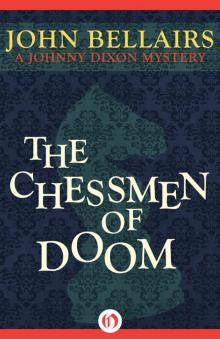 Chessmen of Doom
Chessmen of Doom Secret of the Underground Room
Secret of the Underground Room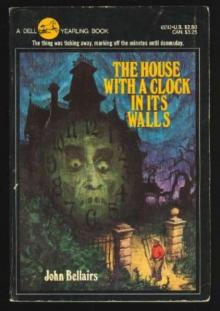 The House With a Clock in Its Walls
The House With a Clock in Its Walls The Vengeance of the Witch-Finder
The Vengeance of the Witch-Finder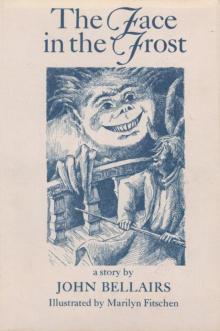 The Face in the Frost
The Face in the Frost Revenge of the Wizard's Ghost
Revenge of the Wizard's Ghost Spell of the Sorcerer's Skull
Spell of the Sorcerer's Skull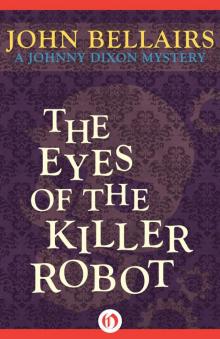 Eyes of the Killer Robot
Eyes of the Killer Robot Mummy, the Will, and the Crypt
Mummy, the Will, and the Crypt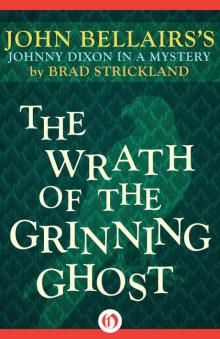 Wrath of the Grinning Ghost
Wrath of the Grinning Ghost The Mansion in the Mist
The Mansion in the Mist The Doom of the Haunted Opera
The Doom of the Haunted Opera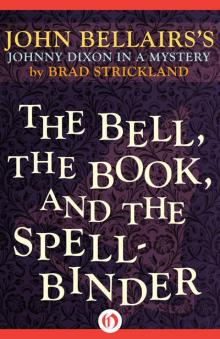 The Bell, the Book, and the Spellbinder
The Bell, the Book, and the Spellbinder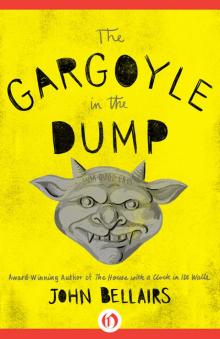 The Gargoyle in the Dump
The Gargoyle in the Dump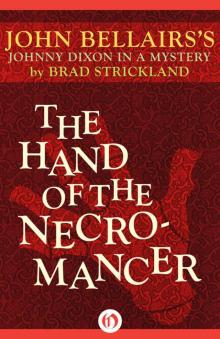 The Hand of the Necromancer
The Hand of the Necromancer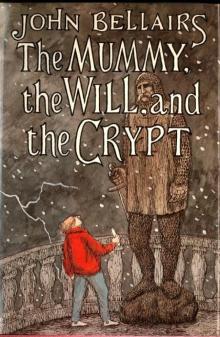 The Mummy, the Will, and the Crypt
The Mummy, the Will, and the Crypt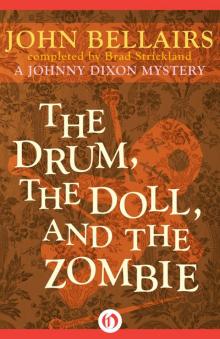 Drum, the Doll, and the Zombie
Drum, the Doll, and the Zombie The Specter from the Magician's Museum
The Specter from the Magician's Museum The Letter, the Witch, and the Ring
The Letter, the Witch, and the Ring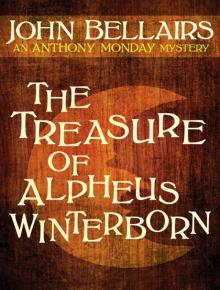 The Treasure of Alpheus Winterborn
The Treasure of Alpheus Winterborn The Dark Secret of Weatherend
The Dark Secret of Weatherend The Figure in the Shadows
The Figure in the Shadows